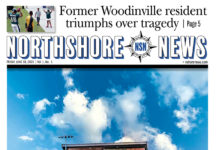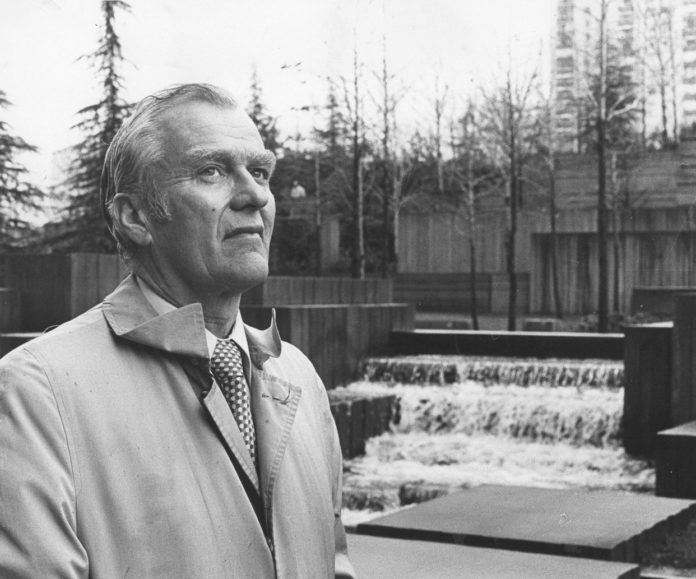“He was a tremendous family man; he was a community leader and a visionary,” Robert Ellis said of his father, Jim Ellis, shown here at Freeway Park. (Seattle Times file, 1980)
By Larry Coffman
The Seattle area has lost the greatest civic leader in its history. And no one else is even close.
James Reed (Jim) Ellis died on Oct. 21 at the age of 98. But the legacies of his unparalleled civic contributions live on—from Freeway Park to King County Metro, from a feces-free Lake Washington to the Seattle Aquarium, from the fertile farmlands of South King County to the Mountains to Sound Greenway along I-90, and countless other civic projects.
The front-page Seattle Times obituary and his unusually long biography on History Link thoroughly cover all aspects of Jim’s remarkable life, including his disappointment over the double defeat of a proposed $1 billion rail-rapid-transit system in 1968 and again in 1970. I had the great privilege of working with Jim on transit matters for nearly two decades, beginning in 1967, and have some precious memories to share of my times with him.
I first got to know Jim when I was a reporter with The Seattle Times, covering the 13-part Forward Thrust capital-improvement program he had created and was spearheading. When the centerpiece of the program—the $1 billion Metro rail-rapid-transit system—failed at the ballot in 1968, he decided to refine the plan and resubmit it to the voters in 1970.
My coverage of Forward Thrust as a Times reporter culminated in an assignment to write the cover story on Jim for the Times’ Sunday Magazine, just before the Forward Thrust election in the Spring of 1968. It was a lengthy piece and, although he was very busy, Jim was generous with his time and quite forthcoming. I had no idea that, shortly thereafter, we would begin a working relationship.
As the “Father of Metro” and its legal counsel, Ellis had written the original legislation to give the agency additional powers, beyond the sewage-treatment function that had cleaned up Lake Washington. One of these was public transportation and, in the Summer of 1968, he activated the Metro transit function and began the search for its first employee.
I also had gotten to know Seattle Mayor Dorm Braman well through my coverage of Forward Thrust in general and the transit issue in particular, and the mayor was deeply involved in the transit issue. To my complete surprise, he and Jim offered me the Metro transit job, which led to this indelible memory…
I still can picture walking with Jim, past Deputy Mayor Ed Devine’s cluttered desk, and into the mayor’s office on the top floor of Seattle City Hall on a visit to pass muster with Mayor Braman. I only remember that the discussion was brief and that I left with the job—at about double my salary at The Times.
My primary responsibility as the Metro transit planning coordinator was to staff the Technical Advisory Committee that was refining the rail-transit plan for resubmission to the voters in 1970. The job included taking careful notes at each committee meeting…
After each meeting, I would go either to Jim’s Preston Thorgrimson Ellis law office, high up in the IBM Building, or to his home on the shore of Lake Washington in Bellevue, to review my notes with him. Jim was the only person I ever knew who edited copy by always adding to—rather than deleting—words in the text. But most importantly, I quickly learned how meticulous he was about the public record of our planning process.
During several of those visits to his home over the years, I was joined by daughter, Melissa, who was an avid stamp collector. When Jim learned of Melissa’s interest in stamps, when she was along, he would haul out his collection and do some trading, most often sitting on the living-room floor with her. That told me lots about Jim’s humanity.
Besides staffing the committee, my other big job was to visit the Bay Area and learn all I could about the BART rail-transit system, which was in its infancy and was the model for Seattle’s proposed system. A highlight was when we brought a BART car to Seattle Center, where Jim and several other dignitaries unveiled it at a promotional event. Unfortunately, the Boeing Bust coincided with the resubmission, and the issue again failed, enabling Atlanta to get the federal funds for its MARTA system that had been reserved for Seattle. Many call it the Seattle area’s worst-ever civic blunder.
Determined not to let transit die, Ellis then drafted bills that would make motor-vehicle-excise tax and sales-tax dollars available to fund transit, with voter approval. [Property taxes, requiring a 60% majority vote, had been the local-funding source for the rail plan; the two new sources would require only a simple majority.] My new job was as lead lobbyist of the bills in the 1971 state legislative session, with lots of help from Jim, Bob Gogerty and a prominent politician…
During the session, I would drive Jim to Olympia, sometimes several times a week, to testify on the bills. Often we were joined on the trip by political heavyweight Joel Pritchard. Joel was between jobs in a public-service career that saw him serve as both a Washington state and U.S. representative and lieutenant governor (along with being the inventor of pickleball!). It was amazing to watch Jim and Joel’s influence with legislators on both sides of the aisle, which resulted in the passage of both bills. [Joel was the first person I ever heard say, “You can accomplish anything if you don’t care who gets the credit.”]
I managed the subsequent election in 1972 to create the Metro Transit all-bus system, which received a 60+% majority, and was appointed the marketing manager. My contacts with Jim were less frequent after that, but I vividly remember four experiences…
The night of the bus-system election, Jim and I were in the cloak room off the main dining room at the Four Seasons Olympic Hotel, just before he went out to give a victory speech. He grabbed my arm, looked me straight in the eyes and said, “Good job, Larry, now we have to deliver!” [We apparently did, because the Metro Transit system twice was named the best in North America by the American Public Transit Association.]
On a visit to Jim’s office to discuss a marketing campaign, he led me to a window in the law library, looking down on I-5 as it passed through the heart of the city. He said, “Larry, what would you think of a lid over the freeway to create a beautiful park that knitted the property on both sides of the freeway together?” [And you know the rest of that story, too. Jim completed the Freeway Park project, as well as the adjoining Washington State Convention Center, for which he served as president of the board during its construction and early years of operation.]
On several of those visits, he let me sit in his office as he placed or took phone calls from the likes of “Maggie” (Sen. Warren Magnuson) or “Scoop” (Sen. Henry Jackson), both powerful Democrats with whom he was good friends, even though Jim was strongly Republican. His apolitical approach clearly was key to his ability to solve challenging civic problems.
And when Jim retired from his long-time position as Metro’s legal counsel, a huge party was held in his honor at the Four Seasons Olympic Hotel. Dignitaries on the dais included three of his Republican colleagues, former Governors Dan Evans and John Spellman and then-Lieutenant Governor Joel Pritchard. In those days before PowerPoint, I had the honor of presenting a slide show of Jim’s life, with the majority of photos provided by his wife, Mary Lou. His warm “thank you” afterward was more than enough compensation for the hours it took to put the show together.
Two other Ellis-related events also are memorable.
On the occasion of Tom Gibbs’ retirement as executive director of Metro, I staged a skit in a large room at the Westin Hotel. Jim was played by Wally Toner, who entered wearing the kind of tan raincoat Jim favored and carrying a battered and bulging briefcase that also was his trademark. After he took a seat, Wally pulled a big bottle of pink Pepto Bismol out of the briefcase and took a huge swig, as Jim was wont to do at Metro Council meetings, to soothe a chronic stomach disorder. I was sort of glad Jim wasn’t present for that, although I’m sure he would have laughed along with everyone else.
But he was present for his 85th birthday party in 2006, held on a farm in North Bend that was to become part of the Mountains To Sound Greenway Trust, which Jim created and served as chairman of the board. The event was keynoted by Governor Evans and Sen. Slade Gorton, another close Republican colleague.
It was a grand reunion, on a warm and sunny day, with lots of friends and colleagues from my Metro days. Sadly, too many of them have passed in just 13 short years: Jerry and Penny Peabody (Melissa’s godmother), Phyllis Lamphere, Aubrey Davis, Tom Gibbs, Bob Gogerty, Wally Toner, Don Munro…and, now, Jim Ellis.
So—how do we memorialize our greatest-ever civic leader? A couple years ago, I floated the idea of renaming Lake Washington as Lake Ellis, but that may be a reach. However, the James R. Ellis Greenway is a no-brainers—for starters. [Ed. Note: It’s already the Jim Ellis Freeway Park.]
What’s your suggestion?






